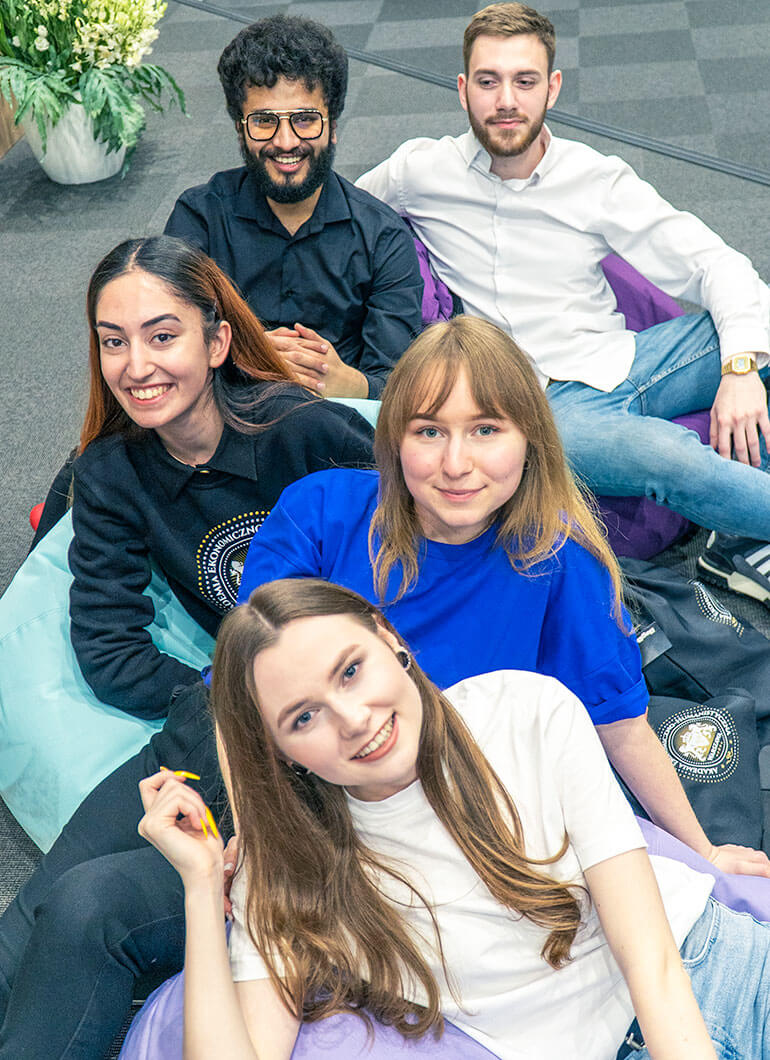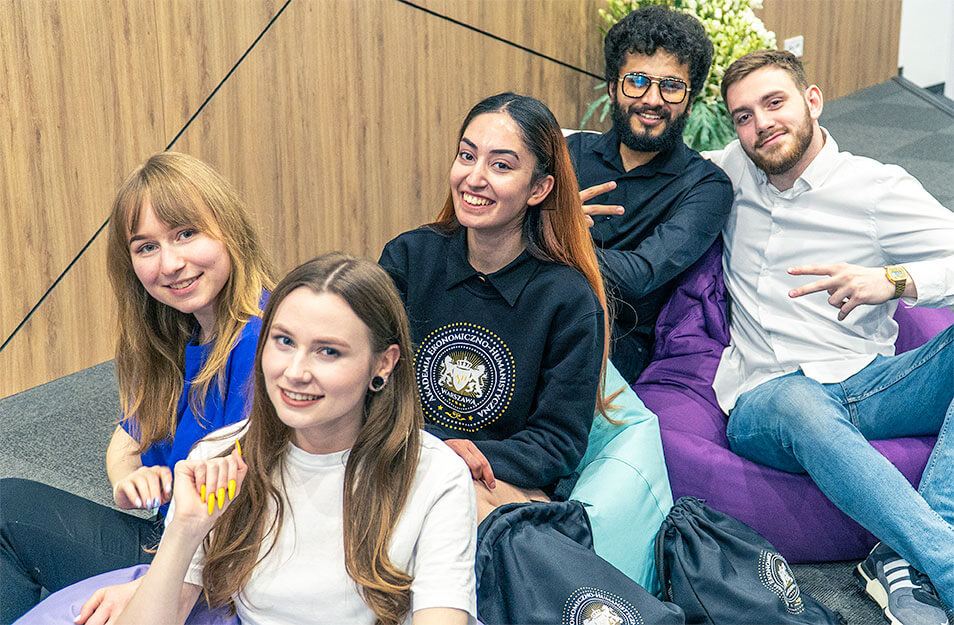International Relations
Graduate (Master)
International relations and security
Why you should choose this field?
The current affairs on the global stage have unequivocally proven wrong all theories presaging the impending “end of history”. The era of the global dominance of the West, its disproportionate wealth, military power, and of the indolence of its international organizations is slowly coming to an end. The twenty-first century will bear witness to numerous new conflicts, arms race, new geopolitical threats, and a slow yet systematic consolidation of the positions of the developing countries of Asia, Africa, and Latin America.
The new reality has also necessitated a change in the obsolete methods employed in the teaching of Political Sciences. Our graduates are not just theoreticians, specialists characterized by an exceptionally wide range of competences and above-average analytical skills. They are professional analysts who are able to use scientific bases of research to analyse various phenomena and data, interpret them, and – most importantly – report them in a skilful and understandable way.
What you can do after graduating?

Regardless of whether you see yourself, in the future, working for national, regional or local authorities, or rather for the private sector, during your studies you will gain a wide range of practical skills and competences which will allow you to take up a job in your dream profession. Career paths will become available to you, such as political expert, diplomat, public official, data analyst, expert in strategic management, forecasting specialist, risk analyst, risk manager, or journalist.
This is the right programme for you if:



Programme and structure of studies
MASTER STUDIES
The teaching model is focused on major subjects pertaining to the field of Political Sciences and Administration as well as Security Studies, which will allow you to gain practical skills.
First year of studies
Right from the start, the programme is replete with specialized major subjects, the aim of which is to provide students with a wide range of knowledge and practical skills in diverse thematic areas.
| Subject name | Cummulative amount of ECTS points | Cummulative amount of hours (FT/PT) |
| Occupational Health and Safety | 0 | 8/8 |
| Problems of Economic Growth and Development in Developing Countries | 5 | 60/32 |
| Problems and Dilemmas of Modern Democracy | 5 | 60/32 |
| Modern Great Powers | 5 | 60/32 |
| Society, Religion and Culture in International Relations | 2 | 30/16 |
| Public Diplomacy | 3 | 30/16 |
| Diplomacy in International Relations | 3 | 30/16 |
| Democracy and Technology | 2 | 30/16 |
| Universal History / Culture and Ethics (to be chosen by the student) | 5 | 30/16 |
| Subject name | Cummulative amount of ECTS points | Cummulative amount of hours (FT/PT) |
| Introduction to International Business | 5 | 60/32 |
| War and Politics | 5 | 60/32 |
| International Forecasts and Simulations | 4 | 46/24 |
| Environment and Natural Resources Management Policy | 4 | 46/24 |
| Globalization and Glocalization | 3 | 30/16 |
| Europeanization | 2 | 30/16 |
| The European Union in International Relations | 3 | 30/16 |
| Foreign language | 2 | 30/16 |
| Team Communication / Managerial Skills (to be chosen by the student) | 2 | 30/16 |
The courses will be opened providing that a required minimum number of students enrol.
Second year of studies
From the second year on, students attain a real influence on what they want to study by personally selecting classes they wish to attend from a list of seven pre-defined elective courses. Starting from the 3rd term, students begin working on their MA theses and attending their thesis seminar. During the second year, students are required to do work experience.
| Subject name | Cummulative amount of ECTS points | Cummulative amount of hours (FT/PT) |
| Migration Management / Crisis Management (to be chosen by the student) | 3 | 60/32 |
| Poland’s Security Policy / Organization and Functioning of Polish Foreign Service / Poles and Polish Diaspora in the World (to be chosen by the student) | 3 | 30/16 |
| European Projects / Technologies in International Relations (to be chosen by the student) | 3 | 30/16 |
| Geopolitics of Cybersecurity / Security Institutions in International Relations (to be chosen by the student) | 3 | 30/16 |
| Decision games – challenges and threats to national security | 3 | 30/16 |
| Postmodern Terrorism and Counterterrorism | 2 | 30/16 |
| Foreign language | 3 | 30/16 |
| Diploma Thesis Seminar | 3 | 30/16 |
| Work Experience | 7 | 180/180 |
| Subject name | Cummulative amount of ECTS points | Cummulative amount of hours (FT/PT) |
| International Crime and Criminal Responsibility in International Law / Problems of Sustainable Development (to be chosen by the student) | 5 | 60/32 |
| Global Health Policy Issues / Energy and Climate Policy (to be chosen by the student) | 4 | 30/16 |
| Euroscepticism / Public Participation in a Smart City (to be chosen by the student) | 4 | 30/16 |
| International Market Management | 5 | 60/32 |
| Diploma Thesis Seminar | 5 | 30/16 |
| Work Experience | 7 | 180/180 |
The courses will be opened providing that a required minimum number of students enrol.
The content of the study program may change as a result of efforts to improve the quality of education and adapt the teaching offer to the current challenges of the labor market. Each change is approved by the University Senate and introduced with the aim of preparing students for their future careers in the best possible way.
Tuition fees
Fixed tuition - flexible payments
By choosing to study at VIZJA University, you can be sure that the tuition fee will not change throughout the duration of your studies. You can pay the tuition fee once for the entire year of study or spread over a semester payment. This allows you to decide how you want to plan your expenses.

Fees (academic year 2025/2026)
| Year of study | Annually | Per semester* |
| I | 2800 € | 1550 € |
| II | 2800 € | 1550 € |
*Semester payment is possible from the second year of studies.
| Year of study | Annually | Per semester* |
| I | 3800 € | 2050 € |
| II | 3800 € | 2050 € |
*Semester payment is possible from the second year of studies.
EU and other countries group
This group includes citizens of the countries member states of the European Union and the following countries citizens: Azerbaijan, Belarus, Bosnia and Herzegovina, Montenegro, Georgia, Kazakhstan, Kosovo, Kyrgyzstan, Latin America, Macedonia, Moldova, Russia, Serbia, Tajikistan, Turkey, Turkmenistan, Ukraine, Uzbekistan.
Other countries
The citizens of all the remaining countries.
Study in Polish!
Do you want to study at VIZJA University in Polish? It is possible! We have prepared a special program for international students to acquire the skills necessary for active study in Polish and for academic, social and everyday life in Poland.
The Comprehensive Polish Language Program for International Students is:
- part of The VIZJA University Foundation Program, which is a comprehensive preparation for starting regular Bachelor's or Master's studies in Polish at VIZJA University
- a course aimed at two groups of international students: students with knowledge of a Slavic language (Russian, Ukrainian, Czech etc.) and students without prior knowledge of any Slavic language
- a chance for immersion in Polish society and culture, authentic experience of life in Poland and broad career prospects on the Polish labour market
More details coming soon!
Scholarships - easier than you think

While studying at VIZJA University, you can take advantage of a wide range of financial support from the state budget and European funds, as well as benefit from special discounts with VIZJA University discount program
You can submit most scholarship applications quickly and easily through your online account.
In the academic year 2023/2024, VIZJA University awarded 800 Rector’s Scholarships, ranging from PLN 400 /month to PLN 1000 /month, depending on the average or achievements. For outstanding sport, artistic or scientific achievements, the Scholarship Committee awarded scholarships of PLN 600 /month.
Detailed information on the possibility of applying for the Rector’s Scholarship is available in the dean’s system.
A sports scholarship may be awarded to a student who excels in sport achievements at least national level. In addition we also encourage our students to take part in additional support programs- eg. the National Academic Representation.
Young sportsmen can count on financial support in the amount of PLN 600 /month.
Detailed information on the possibility of applying for sports scholarship is available in the dean’s system.
A scholarship for people with disabilities may be awarded to a student who has a disability certificate, a disability degree certificate, a ZUS certifying physician’s certificate, a disability group certificate or a certificate of permanent or long-term incapacity to work on a farm.
In the 2023/2024 academic year, depending on the degree of disability, 350 scholarships for people with disabilities were awarded, ranging from PLN 1700 /month to PLN 1900 /month.
Detailed information on the possibility of applying for a scholarship for people with disabilities is available in the dean’s system.
The allowance is a form of emergency financial assistance. Any student who found himself temporarily in a difficult life situation resulting from random events beyond the student’s control can apply for it.The allowance may be granted twice in one academic year, and the allowance is not granted twice for the same random event.
In 2024, we granted 51 allowances for a total of PLN 255 000. The allowances, depending on the student’s situation, were paid in the amount of PLN 2,000 to PLN 5,000 at a time.
Detailed information on the possibility of applying for the allowance is available in the dean’s system.
2023/2024 academic year
800 Rector’s Scholarships
51 allowances
350 scholarships for people with disabilities
12 500 000 PLN was spent in 2023/2024 on scholarships
PLN 1,890,289.35 was spent in 2019/2020 on scholarships
PLN 2,911,662.50 was spent in 2020/2021 on scholarships
PLN 4,158,177.00 was spent in 2021/2022 on scholarships
PLN 7,829,950.00 was spent in 2022/2023 on scholarships
Rector’s Scholarship – highest average: 5,44





